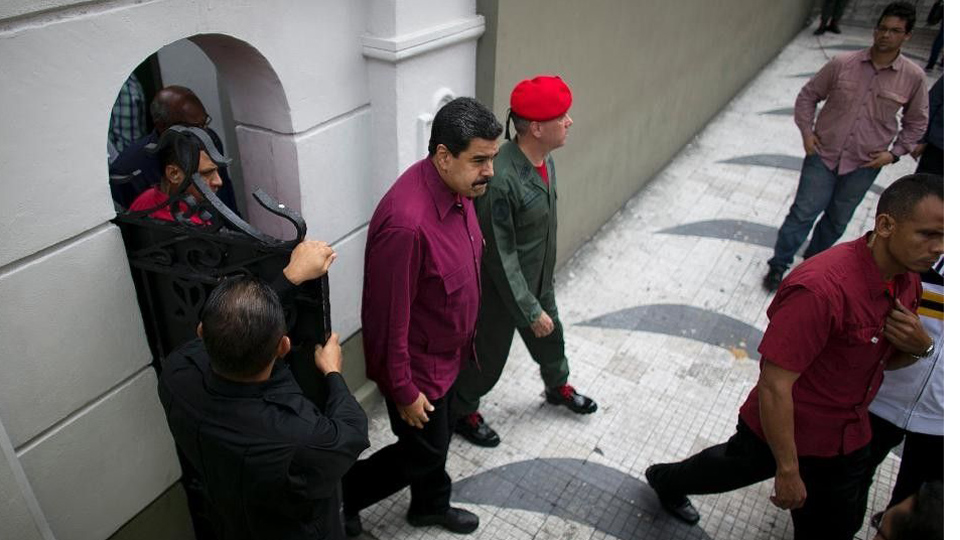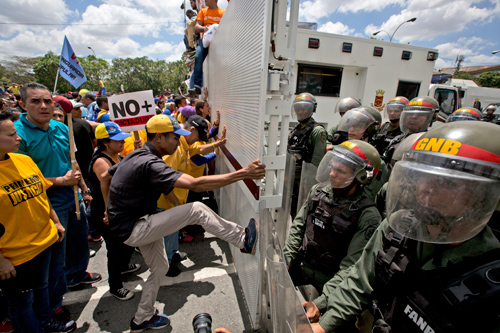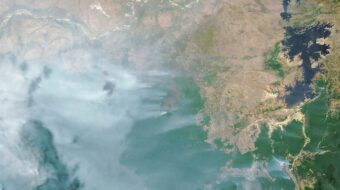
Venezuelan President Nicolás Maduro’s opponents are close to their goal of toppling the socialist government he heads in Venezuela. The U.S. government seems to have recruited a well-to-do coterie of Venezuelans as well as international allies to the task. The Organization of American States (OAS), set up by the United States in 1948 as a Cold War tool, is on the job.
OAS Secretary General Luis Almagro, on March 14, released a 75-page report blaming the Maduro government for human rights abuses, humanitarian disaster, and failing to negotiate with the political opposition. It threatened that if new elections are not held soon in Venezuela, the OAS would invoke its Democratic Charter and possibly expel the country.
The “Inter-American Democratic Charter” of the OAS allows for diplomatic action against nations accused of violating democratic rights, up to and including suspension.
Also on March 14, 14 nations under U.S. and Mexican leadership issued a statement asking the Venezuelan government to “restore democracy” by releasing political prisoners and holding the elections for state governors and municipal officials that had been previously postponed. A White House official indicated “the statement was a major step towards an OAS suspension.”
At a special OAS meeting March 28 in Washington, delegates discussed Venezuela but backed away from applying the Democratic Charter; the required two-thirds majority was lacking.
Florida Republican Senator Marco Rubio had already warned Haiti, the Dominican Republic, and El Salvador that they would receive no U.S. foreign aid if at the meeting they failed to vote for Venezuela’s expulsion.
Where does power reside?

The offensive against Maduro’s government escalated following the unfolding of a dispute over separation-of-powers between the legislative and judicial branches of the Venezuelan state.
On March 29, Venezuela’s highest court, the Supreme Tribunal of Justice (TSJ by its Spanish initials), having previously disempowered the opposition-controlled National Assembly, proposed to assume legislative power in its stead. For OAS head Almagro, this was a “self-coup” indicating that the time had come to activate the Democratic Charter.
The context for the TSJ’s actions was that in early 2016 it had disqualified three recently-elected delegates to the National Assembly from Amazonas state from taking their seats following allegations they had purchased their electoral victories. When the three eventually resigned, their absence deprived the opposition of the two-thirds majority required to block key government proposals.
The Assembly persisted in ignoring a TSJ order for new elections in Amazonas for the disputed seats, however. According to a report from the BBC, the National Assembly on January 9, 2017 declared that President Maduro had, in effect, abandoned his office and that new presidential and local elections were required. According to a reporter, Maduro has been relying on the TSJ to govern, inasmuch as “the activities of the Assembly have been consistently annulled by the Supreme Tribunal for Justice.” The Assembly on March 21 voted for “reactivation of the process of the Inter-American Democratic Charter of the OAS to be applied.”
Defenders of the Maduro government, however, say the Assembly’s refusal to follow the TSJ’s ruling rendered its actions legally vulnerable.
That legal vulnerability recently became important when the state-owned petroleum company PDVSA asked the Assembly for authorization of business contracts with foreign entities, a process required by the Venezuela’s “Law of Hydrocarbons.”
The Assembly’s legal problem supposedly made for risky contracts and so, using the justification of acting in the interest of the national economy, the TSJ on March 29, on a one-time basis, took over power from the Assembly and authorized the contracts.
President Maduro quickly appealed to the country’s National Security Council – members are drawn from all branches of the government – to “bring peace and calm to Venezuela.” He was reacting, at least in part, to Attorney General Luisa Ortega’s diagnosis of a “rupture of the Constitutional order.”
The TSJ bowed to the Council’s insistence that it not take on legislative functions and that it back away from having declared legislators ineligible for parliamentary immunity. Power over future contracts dealing with joint-venture business investments and oil projects was granted to the president, however. Going forward, Maduro will not have to seek the legislature’s approval.
Such is the context for the current political crisis. Advances in health care, education, housing, and old age assistance carry little weight in the discussion. That’s the case also with the government’s rationalizations for its recent actions.
The latest in a line of crises
There have been previous crises. Governmental shortcomings have been factors, but alterations in the world economy and destabilization by Venezuelan capitalists have also taken hold. Businesses have cut back on imports and production of goods and hoarded them to promote shortages.
The worldwide drop in oil prices led to reduced income from oil exports. Money for funding social programs disappeared, and dollars too. Consequently, money is being printed, the black market in dollars expands, and inflation mounts.
The failed military coup and a prolonged oil-workers strike in 2002 and periodic, prolonged, violent, and even deadly street demonstrations have destabilized in their own ways.
President Maduro’s narrow electoral victory in March 2013 and his government’s loss of a National Assembly majority via elections on December 6, 2015 warned of trouble ahead. In March 2015 and January 2017, the U.S. government named Venezuela as a threat to U.S. national security and deserving of economic sanctions.
The latest crisis is reminiscent of coups removing other progressive presidents; for example: Mel Zelaya in Honduras, 2009; Fernando Lugo in Paraguay, 2012; and Dilma Rousseff in Brazil, 2016. Each time, shenanigans operated in and around the various parliaments. In Venezuela’s case, involvement of the OAS and conservative governments in the region is new.
The U.S. government works to build relationships. In targeted countries, its agents befriend businesspersons, bankers, legislators, youth groups, and soldiers. Money flows. The media falls in line. The approach fits well for parliamentary coups.
According to Mexico’s La Jornada newspaper, “Parties of the MUD [opposition coalition] have met [in the U.S. embassy in Caracas] countless times. The rooms are a beehive of meetings. Activists, businesspeople, and bankers turn up to receive instructions. Agents posted to Latin America are there precisely to watch over developments. The contact is Tenney Smith, a high ranking military person belonging to the Defense Intelligence Agency, and Rita Buck Rico, assigned to the political affairs section of the foreign services.”












Comments